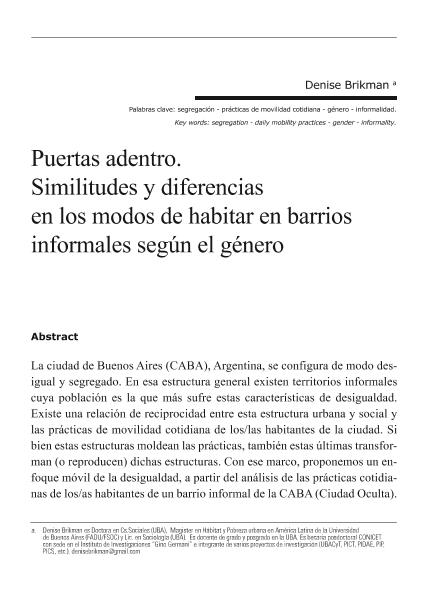Mostrar el registro sencillo del ítem
dc.contributor.author
Brikman, Denise

dc.date.available
2022-08-19T19:21:56Z
dc.date.issued
2021-09
dc.identifier.citation
Brikman, Denise; Puertas adentro: Similitudes y diferencias en los modos de habitar en barrios informales según el género; Instituto Internacional de Medio Ambiente y Desarrollo América Latina; Medio Ambiente y Urbanización; 94; 1; 9-2021; 77-108
dc.identifier.issn
0328-0306
dc.identifier.uri
http://hdl.handle.net/11336/166137
dc.description.abstract
La ciudad de Buenos Aires (CABA), Argentina, se configura de modo desigual y segregado. En esa estructura general existen territorios informales cuya población es la que más sufre estas características de desigualdad. Existe una relación de reciprocidad entre esta estructura urbana y social y las prácticas de movilidad cotidiana de los/las habitantes de la ciudad. Si bien estas estructuras moldean las prácticas, también estas últimas transforman (o reproducen) dichas estructuras. Con ese marco, proponemos un enfoque móvil de la desigualdad, a partir del análisis de las prácticas cotidianas de los/as habitantes de un barrio informal de la CABA (Ciudad Oculta). Concretamente nos interesa profundizar si el género opera (o no) como una variable que intensifica los efectos de la segregación de quienes residen en barrios informales. Para llevar a cabo este análisis realizamos un análisis longitudinal y georreferenciado a partir de datos obtenidos en encuestas en vía pública y presentamos una serie de tipologías de trayectorias diarias, teniendo en cuenta las diferencias que se expresan entre los géneros.
dc.description.abstract
The city of Buenos Aires (CABA), Argentina, is configured unevenly and segregated. In this general structure there are informal territories whose population suffers the most from these characteristics of inequality. There is a reciprocal relationship between this urban and social structure and the daily mobility practices of the city’s inhabitants. While these structures shape practices, the latter also transform (or reproduce) these structures. With this framework, we propose a mobile approach to inequality, based on the analysis of the daily practices of the inhabitants of an informal neighborhood of CABA (Ciudad Oculta). Specifically, we are interested in delving into whether gender operates (or not) as a variable that intensifies the effects of the segregation of those who live in informal neighborhoods. To do this research process, we carried out a longitudinal and georeferenced analysis based on data obtained in surveys on public roads and presented a series of typologies of daily trajectories, taking into account the differences that are expressed between genders.
dc.format
application/pdf
dc.language.iso
spa
dc.publisher
Instituto Internacional de Medio Ambiente y Desarrollo América Latina
dc.rights
info:eu-repo/semantics/openAccess
dc.rights.uri
https://creativecommons.org/licenses/by-nc-sa/2.5/ar/
dc.subject
PRACTICAS DE MOVILIDAD COTIDIANA
dc.subject
SEGREGACIÓN
dc.subject
GÉNERO
dc.subject
ASENTAMIENTOS INFORMALES
dc.subject.classification
Otras Sociología

dc.subject.classification
Sociología

dc.subject.classification
CIENCIAS SOCIALES

dc.title
Puertas adentro: Similitudes y diferencias en los modos de habitar en barrios informales según el género
dc.type
info:eu-repo/semantics/article
dc.type
info:ar-repo/semantics/artículo
dc.type
info:eu-repo/semantics/publishedVersion
dc.date.updated
2022-08-19T14:46:06Z
dc.journal.volume
94
dc.journal.number
1
dc.journal.pagination
77-108
dc.journal.pais
Argentina

dc.journal.ciudad
Ciudad Autónoma de Buenos Aires
dc.description.fil
Fil: Brikman, Denise. Consejo Nacional de Investigaciones Científicas y Técnicas; Argentina. Universidad de Buenos Aires. Facultad de Ciencias Sociales. Instituto de Investigaciones "Gino Germani"; Argentina
dc.journal.title
Medio Ambiente y Urbanización
dc.relation.alternativeid
info:eu-repo/semantics/altIdentifier/url/https://www.ingentaconnect.com/contentone/iieal/meda/2021/00000094/00000001/art00004#
Archivos asociados
